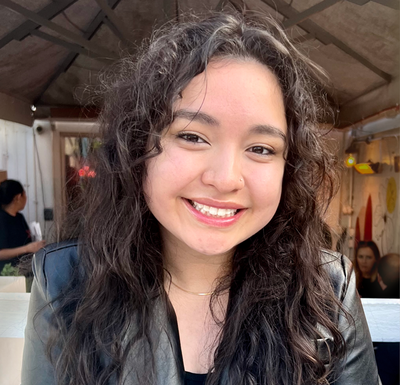Galvanized by issues like climate change and police violence, young people have shown their engagement with our democracy by protesting, volunteering, and voting in record numbers.
“It seems that between the ages of 18 and 30, increasing numbers of young people engage with politics, are interested in politics, and share their political voice,” writes Brennan Center Fellow Elan C. Hope. “This is especially true for Black and Latino young adults, who show the most growth in political participation and interest throughout young adulthood.”
One of the most popular types of civic engagement, Hope notes, happens within the family, through conversations with parents and relatives that at times can be uncomfortable.
We asked Tanya Martinez, a 21-year-old junior at the University of Chicago majoring in public policy who is active with organizations that serve immigrants and encourage voting, about the kind of political and social issues she brings up at home, the messages she wants to convey, and the reactions and surprises that come with sharing views openly even with loved ones.
What topics do you bring up for discussion with your parents, both immigrants from Mexico?
A lot of time we talk about unions, and immigration, and socioeconomic disparities, and education. I have always been someone that has spoken about politics. The first time I did it, I think I was eight years old. We had learned about climate change for the first time in school, and I ran home and spoke to my dad for an hour about how bad his pickup truck was for the environment. “Your truck is terrible. We’re killing the planet.” I talked to him for what must have been an hour until I convinced him to bring in this bucket we had kept in our garage, which has served as a recycling bin for the last 13, 14 years now. So, we started to recycle after that. (The father sold his truck two years later.)
In high school, I was pretty politically involved. I’ve protested a lot of times — against the Trump administration separating families, the summer of George Floyd’s death.
How easy or difficult is it to engage in these conversations?
During the George Floyd protests, my mom started to get angry at me. She was like, “This is dangerous.”
But she came around. I tried to make it more relatable. I tried to break it down to how similar it was to being an immigrant and being targeted by a lot of authorities and feeling like you weren’t protected by the state even though you still pay taxes and work.
 Tanya Martinez
Tanya Martinez
Where do you get your news and information?
I study public policy, so a lot of my sources come from class and end up being scholarly journals, law reviews, newspapers, or news articles — the Washington Post, the Atlantic, the New York Times.
My parents get most of their news from Univision. They watch the five o’clock news every day. They also listen to radio stations going to work. It’s generally the news, but the thing that’s problematic is that my dad will sometimes get a lot of news from his coworkers — and a lot of that is actually incorrect. My mom loves Facebook and will see a bunch of random articles shared by her friends or just what comes up on her wall. A lot of the time, those articles aren’t credible.
People, and specifically policymakers and researchers, always overlook and underestimate how powerful word of mouth is within the immigrant community. Because literally, that is the one resource that regardless of your documentation, you will always have. You’ll always have friends or family or someone, even if it’s someone abroad, who you get information from. What’s really important to me is the fact that when I get through to my mom, I’m not just getting through to her. I’m getting through to a lot of her friends as well who she’ll talk to about it afterward.
Any tips about how to get your message across effectively, without antagonizing your audience?
I’m the eldest of four, and growing up, I made sure that my conversations were not only with my parents but also with my sisters. Like, “Listen. This thing happens in the world, and this is why it’s bad.” It’s almost like a strategy, but it works. It helps in the sense that it makes adults more willing to listen to you when these children that they adore and protect are all kind of in agreement that what they’re saying or what they believe in isn’t necessarily right.
And you shouldn’t be demeaning when you’re speaking to adults, because while it is true that a lot of the time young people feel like they’re dismissed, like we’re not taken seriously or whatever, I honestly think that my parents are scared of the opposite occurring. My mom, who was a housewife for most of my life but recently started work at a school cafeteria, stopped going to school in the third grade, my dad (a worker at a car parts warehouse) after fifth grade. They have elementary education, and I’m an undergraduate student at UChicago, which means that there’s an imbalance in knowledge, at least academic and scholarly knowledge, that I think almost makes them feel a little alienated. So, whenever I do try to approach them, I try to begin with “listen, it’s not that I’m trying to write off your opinions or perspectives. I think these are very valid concerns, but why don’t you think about it like this?”
Also, I do not think it’s very effective or efficient to conflate your parents. By kind of hitting them each individually first, you get to gauge where everyone lies. And what kind of values everyone has, and what people initially think about when you ask them questions. Then you can kind of start to bring it to the dinner table, and you can have a really enriching conversation.
What have you learned yourself from your family conversations?
The first thing my parents ever taught me was empathy. And the importance of relying on your informal support networks. That’s why it’s important you don’t view them as opponents. You should view them as partners. My parents just always surprise me whenever they show me that they’re flexible and willing to listen to me.
When it comes to politics, when and where would you say is the best place to talk?
Anywhere except with my extended family during any of the major holidays! Thanksgiving dinners have historically been some of the worst dinners of my life.


